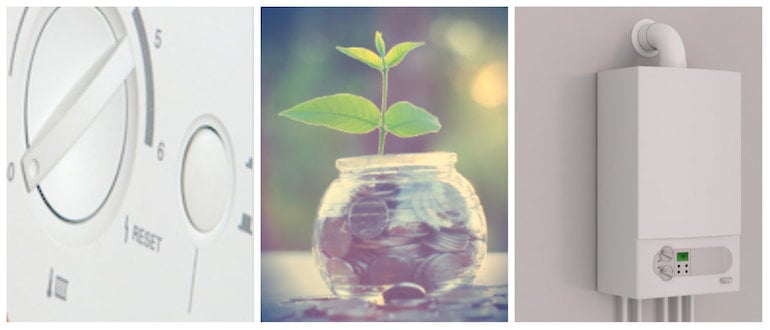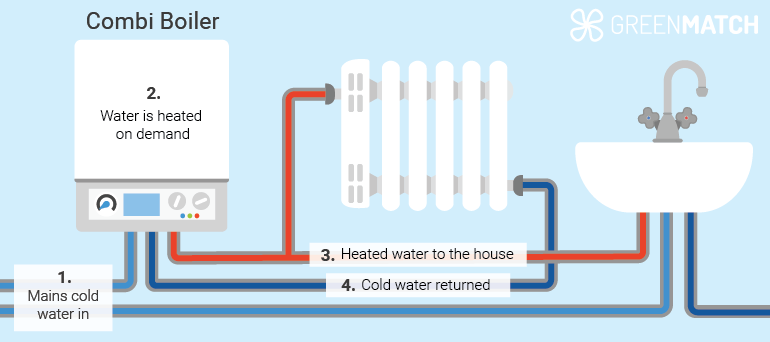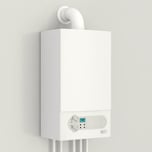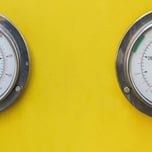Answer these simple questions and we will find you the BEST prices
Which type of solar quotes do you need?
It only takes 30 seconds
100% free with no obligation

Get up to 3 quotes by filling in only 1 quick form

Slash your energy bills by installing an energy efficient boiler

We’ve helped over 500,000 homeowners reduce their carbon footprint
- GreenMatch
- Boilers
- Combi Boilers
What is a Combi Boiler? A Full Explanation & Details


What is a combi boiler?
A combination or combi boiler is a compact boiler unit that can heat both your hot water and your central heating. It does not require additional components such as hot water storage cylinders to work, making it a space-saving and, therefore, a popular choice among homeowners in the UK. In fact, it is the most commonly installed type of boiler in the country.
Combi boilers are easy to install and also to hide away in a kitchen cupboard or boiler cabinet. These features enable you to merge a combi boiler with your home’s style. On top of that, they are also very convenient. Combi boilers provide a fast supply of instant hot water since they take water directly from the mains and heat it as required. In this article, we will take a closer look at combi boilers, their specific types, how they work, their pros, cons, and costs.
Are you interested in a combi boiler? GreenMatch can help you find the one that best meets your needs. We will save you hours of research time and effort thanks to our team of heating experts and our nationwide network of partner installers. Ask for quotes now, and we will send you up to 3 tailor-made quotes for free. You are not obliged to accept any of them.
- Quotes from local engineers
- Payment by finance available
- Save up to £975
It only takes 30 seconds



What type of heating is a combi boiler?
Combi boilers are simple units. Usually, they are designed for wall-mounted installation. The most significant difference between their different types is the fuel they use. Currently, there are 4 main types of fuels for combi boilers: gas, oil, LPG (Liquified Petroleum Gas), and electricity.
Gas combination boilers
Gas combi boilers are the most common combi boilers in the UK. They run on natural gas sent to homes via the national gas grid. Even though natural gas is produced from fossil fuels, it is considered cleaner than oil and coal.
Although they release CO2 into the atmosphere when running, all modern combi models have inbuilt condensing technology that makes them highly efficient heating units. This technology ensures that the heat usually lost out of the flue pipe is recycled back into the system.
As a result, you can minimise energy consumption and, therefore, help the environment while keeping your heating bills low.
Oil combi boiler
Oil combi boilers are a cost-effective alternative for houses disconnected from the grid. However, they are not as space-saving as other combi boilers since you will need to store the fuel in an external tank. You must also order refills periodically to ensure you don’t run out of fuel.
Modern oil combi boilers also have inbuilt condensing technology. Nevertheless, this fuel’s emissions intensity (measured in kilograms of CO2 equivalent per kWh) is higher than that of gas.
LPG combi boilers
These boilers run on Liquefied Petroleum Gas, which is a combined product of natural gas and oil extractions. They are also a suitable option for properties disconnected from the grid, with the advantage of being cheaper and slightly cleaner than oil. Many manufacturers already offer gas boilers that are compatible with LPG.
Electric combi boilers
Electric combi boilers boast efficiency ratings of 99-100%, making them the most energy-efficient boiler type available. They don’t waste energy or release CO2 when working. However, they can only achieve a zero-emissions performance as long as the electricity powering them comes from renewable sources.
In this regard, you could combine them with solar panels or check whether your energy supplier favours the use of renewable sources in the energy mix.
Environmental impact of combi boilers
Although it varies greatly from case to case, we can get an overview of the environmental impact of combi boilers, depending on what fuel they use.
For instance, looking at the data from the Energy Saving Trust comparing gas, oil, LPG, and electricity across the UK, we can draw some conclusions based on each fuel’s emission intensity.
| Emission Intensity by Fuel (kilograms of CO2 equivalent per kWh) | ||
|---|---|---|
England, Scotland and Wales | Northern Ireland | |
Gas | 0.213 | 0.213 |
Oil | 0.298 | 0.298 |
LPG | 0.240 | 0.240 |
Electricity | 0.225 | 0.234 |
Source: Energy Saving Trust (July 2023)
It is worth mentioning that data for electricity in the table above refers to the regions’ averages and assumes that it is electricity distributed through the national grid. This is why electricity’s emission intensity appears higher than that of natural gas, as the UK’s electricity generation relies mostly on fossil fuels at the moment.
If you manage to power your electric combi boiler with renewable sources (e.g. solar energy), then its negative environmental impact will be minimal.
At GreenMatch, we are committed to helping you navigate the transition to more sustainable ways of heating your home. In this case, we recommend switching to low-carbon systems such as solar panels, heat pumps, or domestic biomass boilers. However, despite becoming more affordable over time, these are still rather expensive alternatives.
If you are not ready yet to switch because of either technical or financing reasons, consider installing a highly-efficient electric or gas combi boiler. Our experts at GreenMatch can send you up to 3 free offers for these energy-efficient solutions tailored to your home's energy requirements from suppliers that operate near you.
We advise you then compare these offers objectively to lock in the best deal. For instance, in a gas-heated home in England, Scotland or Wales, you could save up to £630 per year on your energy bills by installing a highly-efficient condensing combi boiler. Get started by clicking the button below.
- Quotes from local engineers
- Payment by finance available
- Save up to £975
It only takes 30 seconds



How does a combination boiler work?
Although combi boilers may use different fuels, they all work almost the same way. Every time you turn on a tap or switch on the heating, your combi boiler will fire up and start heating the water that goes through the pipes across your home.
During this process, the cold water from the mains passes over a highly efficient heat exchanger. The heat exchanger transfers most heat from the burnt gas (90% or more) to the cold water and then distributes it to the taps as needed.
The hot water travels to a diverter, and then it is sent either to the pipes for your taps or out into the radiators. Once the water has circulated through the radiators, it is sent back around the circuit, reheated, and used again.
A combination boiler produces a continuous flow of hot water; however, a slight decline in water pressure may occur if you simultaneously use more than one tap or shower. This makes combination boilers more suitable for smaller households with just one bathroom.
Nevertheless, there are combi boiler models powerful enough to meet the heating and hot water demand of houses with 4-5 bedrooms and 2 or more bathrooms.
How does a combi boiler fit in your central heating system (diagram)?
With a combi boiler, you don’t need to install additional components such as a hot water cylinder or a feed water tank. In addition to extra space, this also means that no extra heat will be lost by keeping water hot inside a cylinder.
As you can see, combination boilers are potentially more energy-saving options than other types of boilers. Below we have included a combi boiler diagram showing how they operate.

Advantages of a combi boiler
Combi boilers are the right solution for many homes because of their advantages. Here we’ve listed a few of them:
- Highly efficient
Due to condensing technology, modern combi boilers' efficiency is frequently over 92%. To put it into context, this means that for every £1 you spend on powering your boiler, only 8p is lost in the heating process. Old boilers’ efficiency could be as low as 70-80%, assuming their performance is still acceptable.
- Money-saving, with lower energy bills
Look at the example above: 20-30p does not seem like much money but, added up over time, it is a considerable sum wasted. Combi boilers’ high-efficiency rating can help you cut off your energy bills. How much you can save depends on the efficiencies of your old boiler and the new combi you are replacing it with, as well as on your property size and type.
For instance, replacing a 70% efficient old gas boiler with a highly efficient condensing combi boiler (90%+) in a detached house can save you around £630 per year. We have other in-depth resources that could help you determine what size boiler you need.
- Hot water on demand
With a combi, you get hot water from your taps whenever you need it. This is because combination boilers take their water supply directly from the mains, heat it, and send it to your water outlets right away.
- Small in size
Most combi boilers can be installed within a standard kitchen cupboard, thanks to their compact dimensions. Furthermore, they don't need water storage cylinders or feed tanks; thus, they can save space all around your house. It also makes installation quicker, easier, and potentially cheaper.
Disadvantages of a combi boiler
Naturally, combi boilers also have some disadvantages. These are the main two:
- Not suitable for large homes with multiple bathrooms
Most combi boilers aren't powerful enough to meet great demands for hot water in houses with 2 or more bathrooms, especially if they are used at the same time. Despite some combi models being capable of doing so, you might want to consider a system boiler instead.
- Not ideal for homes with weak mains pressure
Similarly, a combination boiler may struggle to keep a proper flow of water to your taps if your mains pressure is already low. To solve it, you could install an additional pump to strengthen the flow. However, this device comes at an extra cost.
What should you consider when choosing a combi boiler?
When looking for a combi boiler for your home, you should consider its brand, type of fuel, output rating, efficiency, warranty, and price. There might be some other special features you are looking for, but these 6 are essential.
- Brand
Getting a combi boiler from a reputable brand is always a plus. This way, you can rest assured that you have bought a reliable, high-quality boiler. Usually, customer services from top brands are also of a higher quality. You can also look at our section on boiler brands to know which is the best combi boiler on the market for you!
- Type of fuel
As we explained above, combi boilers can run on different types of fuels. Make sure to select one that fits your needs, as each of them has different advantages.
- Output rating
A combi boiler’s output rating is its power, measured in kilowatts (kW). Combi boilers have two output ratings: one for central heating (CH) and another for domestic hot water (DHW).
Compared to regular and system boilers, combi boilers need to be more powerful to achieve the same result. Therefore, the best combi boiler for a 4 bedroom house should have a higher power output than one for smaller homes. The table below shows the approximate combi boiler output ranges meeting the central heating requirements of different houses.
| Approximate Combi Boiler Output Rating (CH Output) | |
|---|---|
Houses with up to 10 radiators (up to 4 bedrooms) | 24-27 kW |
Houses with 10-15 radiators (4-5 bedrooms) | 28-34 kW |
Houses with 15-20 radiators (5+ bedrooms) | 35-42 kW |
- Efficiency
Boilers receive an energy efficiency rating from A (highest) to G (lowest) on an ABC banding scale known as the ErP rating.
All modern gas boilers are highly efficient. Most of them are A-rated, but it is also worth checking their efficiency rating out of 100%. The closer they are to 100%, the lower your bills.
Electric combi boilers, on the other hand, boast 99-100% efficiency ratings. However, many of them have an ErP D-rating. This is because most electricity is generated by burning fossil fuels. Therefore, it is considered carbon-intensive and not very efficient.
If renewable energy generation keeps growing steadily, we might see the ErP rating given to electric combi boilers improve in the near future.
- Warranty
Manufacturers provide different warranties for different combi boilers in their range. Terms and conditions may also vary. When choosing your combination boiler, ensure that it comes with a long warranty period. This way, you can rest assured that your boiler will last a long time.
- Price
Last but not least, the price. The total cost of a new combi boiler consists of the boiler unit and installation costs. Special accessories (e.g. smart thermostats, magnetic filters) may also add to the final price. We will talk more about combi boilers' costs in the next section.
Cost of a combination boiler
New combi boiler prices in the UK range from £500 to £3,000. Among the factors determining the price, we can list:
- The boiler manufacturer you choose
- The model you want (budget, mid-range, premium)
- The type of fuel
- The combi boiler output rating (the higher, the more expensive)
You usually pay a higher price for increased performance and for a prolonged warranty period as well.
In addition, you have to consider installation costs. On average, boiler installation costs in the UK range from £1,600 to £3,500. The two main factors affecting the cost are:
- Varying labour costs in different areas (usually higher in large cities)
- The specific combi boiler replacement situation
Regarding the latter, replacing an old combination boiler with a new one is less expensive than replacing a regular or a system boiler with a combi. It is because cylinders and feed tanks need to be removed and the pipework adjusted in the last two cases. Installing a new combi in a space that is difficult to access may also add an extra amount to the bill.
Probably the best way to keep installation costs as low as possible is to find and compare quotes from different heating engineers in your local area. This allows you to choose the one that best meets your requirements and budget and, therefore, lock in the best deal for you.
The only downside is that researching and sorting options among dozens of suppliers could take you several hours. Not to mention the time you must spend verifying their credentials and checking customer reviews.
However, this is something we are ready to help you with. At GreenMatch, we work with a network of accredited heating engineers across the UK. Fill out the form, and we will send you up to 3 free quotes from our partner installers. You are not obliged to accept any quote you receive.
- Quotes from local engineers
- Payment by finance available
- Save up to £975
It only takes 30 seconds



FAQ
A combi boiler is definitely a good idea, especially if you want a highly efficient boiler in just a single unit. Here are some of the advantages of a combi boiler:
- They are highly efficient boilers
- They can help you save money on your energy bills
- You can get hot water on demand
- They are small in size, allowing installation even within a kitchen cupboard
The two main disadvantages of a combi boiler are:
- They are not suitable for large homes with multiple bathrooms
- They are not ideal for homes with weak mains pressure
There are two main differences between regular and combi boilers:
- Space: Combi boilers are very compact. They combine everything needed to heat your water and radiators in a single unit. In stark contrast, regular boilers need hot water storage cylinders and feed tanks.
- Water demand: Combi boilers are best suited for small to medium-sized homes with 1 bathroom. They may struggle to meet higher demands for hot water. On the other hand, regular boilers can supply multiple hot water outlets at the same time, thanks to the storage cylinder.
Combi boilers can run on a wide variety of fuels, including natural gas, oil, LPG (Liquified Petroleum Gas), and electricity.
You must be aware that the upcoming boiler ban in the UK will affect all types of gas boilers alike: combi, system, and regular boilers. However, it is still unclear when this will happen. Furthermore, it will apply only to new builds, so replacement gas combi boilers are still fine for existing homes.
In any case, combi boilers will not be banned per se, as they can run on fuels other than gas, such as electricity.

Luis Antonio is a seasoned Content Writer with international journalism experience. His writing style, enriched by a Master’s in Journalism, contributes informative content to GreenMatch on topics including low-carbon heating systems.
We strive to connect our customers with the right product and supplier. Would you like to be part of GreenMatch?




